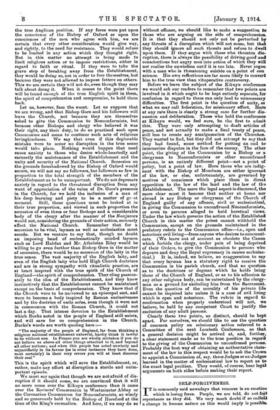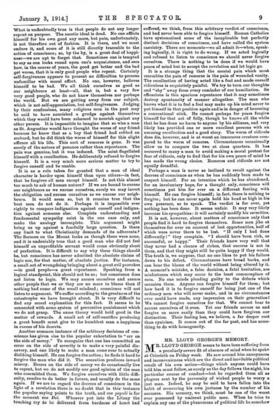SELF-FORGIVENESS
TT is commonly said nowadays that remorse is an emotion which is losing force. People, we are told, do not feid repentance as they did. We very much doubt if so radial a change in human nature as this would imply is possilife. What is undoubtedly true is that people do not any longer repent on purpose. The ascetic ideal is dead. No one afflicts himself for his own good any more, but pain, unfortunately, is not therefore out of fashion. It is 'there, and we must endure it, and some of it is still directly traceable to the action of conscience; so, by the by, is a great deal of happi- ness—we are apt to forget that. Sometimes one is tempted to say as one looks round upon one's acquaiatance, and sees how, in the course of years, the good get better and the bad get worse, that it is only good people who repent. Certainly self-forgiveness appears to present no difficulties to persons unfamiliar with moral effort. No one, however, believes himself to be bad. We all think ourselves as good as our neighbours at least—all, that is, but a very few very good people, who do not know themselves nor perhaps the world. But we are getting away from our subject, which is not self-appreciation, but self-forgivenese. Judging by their confessions, many religious men in the past may be said to have nourished a grudge against themselves which they would have been ashamed to nourish against any other person. It is impossible to imagine that so wise a man as St. Augustine would have thought the worse of any friend because he knew that as a boy that friend had robbed an orchard, but he did think the worse of himself for this slight offence all his life. This sort of remorse is gone. It was surely of the nature of penance rather than repentance. The pain was genuine, but it was induced. The saint flagellated himself with a recollection. He deliberately refused to forgive himself. It is a very much more serious matter to try to forgive oneself and be unable.
It is as a rule taken for granted that a man of ideal character is harder upon himself than upon others—in fact, that he forgives all men except himself. Is not this almost too much to ask of human nature? If we are bound to excuse our neighbours as we excuse ourselves, surely we may invert the obligation and excuse ourselves as we excuse our neigh- bours. It would seem so, but it remains true that the best men do not do it. Perhaps it is impossible ever rightly to compare indignation against oneself and indigna- tion against someone else. Complete understanding and fundamental sympathy exist in the one ease only, and make the analogy incomplete. This argument might bring us up against a fearfully large question. Is there any limit to what Christianity demands of its adherents? The Sermon on the Mount looks as though there were none, and it is undeniably true that a good man who did not feel himself an unprofitable servant would come obviously short of perfection. It is difficult to say why these things should be, but conscience has never admitted the absolute claims of logic nor, for that matter, of absolute justice. For instance, a small act of wrongdoing bringing about a great evil provokes —in good people—a great repentance. Speaking from a logical standpoint, this should not be so ; but conscience does not listen to logic. We may assure ourselves and assure other people that we or they are no more to blame than if nothing had come of the small misdeed ; conscience will not listen to argument. We suffer according to the greatness of the catastrophe we have brought about. It is very difficult to find any moral explanation for this fact. It seems to be connected with some system of preventive punishment which we do not grasp. The same theory would hold good in the matter of rewards. A small act of self-sacrifice producing a great benefit must give to the humblest man a happiness in excess of his deserts.
Another common instance of the arbitrary decisions of con- science has given rise to the popular exhortation to "err on the side of mercy." To recognize that one has committed an error on the side of severity is to make a very painful dis- covery, and one likely to make a man come near to actually disliking himself. He can forgive the action; he finds it hard to forgive the man who did it. The sensation produces inward misery. Errors on the side of mercy we do occasionally live to repent, but we do not modify our good opinion of the man who committed them. We forgive ourselves with little diffi- culty, resolve to do better in future, and usually do the same again. If we are to regard the decrees of conscience in the light of a revelation there is no doubt that in thir instance the popular Baying points to the truth, and vox populi is for the moment vox Del. Whoever put into the Litany the touching cry to be delivered from hardness of heart bad suffered, we think, from this arbitrary verdict of conscience, and had never been able to forgive himself. Roman Catholics have systematized some of the inexplicable but perfectly distinct decisions of conscience, and have called the system casuistry. There are moments—we all admit it—when, speak- ing logically, it is right to do wrong. If we rioted logically and refused to listen to conscience we should never forgive ourselves. There is nothing to be done if we would have peace of mind but to accept the revelation and let logic go.
It is a strange thing that the mental pain which most resembles the pain of remorse is the pain of wounded vanity. The recollection of having acted like a fool and made oneself ridiculous is exquisitely painful. We try to turn our thoughts and " shy " away from every reminder of our humiliation. So efficacious is this spurious repentance that it may sometimes destroy spontaneity of manner altogether. The man who knows what it is to feel a fool may make up his mind never to put himself in that position again and is in danger of becoming a conventional stick. He cannot perhaps for years forgive himself for that act of folly, though he knows all the while that he has done no harm to anyone by his silliness, and very likely has provided one or more excellent persons with an amusing recollection and a good story. The worm of ridicule does die, however, and is at worst an innocuous creature com- pared to the worm of remorse. Circumstances occasionally allow us to compare the two at close quarters- It has occurred to many a man to avoid making a moral protest for fear of ridicule, only to find that for his own peace of mind he has made the wrong choice. B,emorse and ridicule are not equally dreadful.
Perhaps a man is never so inclined to revolt against the decrees of conscience as when he has suddenly been made to suspect himself. For an intention which he has abandoned. for an involuntary hope, for a thought only, conscience will sometimes put him for ever on a different footing with himself. He can forgive himself; in fact, there is nothing to forgive ; but he can never again hold his head so high in his own presence, so to speak. The verdict is for ever, yet nothing has been done. It seems unfair. It may very likely increase his sympathies it will certainly modify his severities.
It is not, however, about matters of conscience only that people find it hard to forgive themselves. Some men jibe at themselves for ever on account of lost opportunities, half of which were never there to be lost. "If only I had done differently I" they complain. "I should have been rich, or successful, or happy." Their friends know very well that they never had a chance of riches, that success is not in them, and that they might still be quite happy if they would. The truth is, we suppose, that no one likes to put his failure down to his defect. Circumstances have broad backs, and can bear the blame of the world without being altered by it. A moment's mistake, a false decision, a fatal hesitation, are misfortunes which may occur to the least commonplace of men. No one minds pleading guilty to the defects which occasion them. Anyone can forgive himself for them; but how hard it is to forgive oneself for being knit one of the ordinary men who will never make, and in no circumstances ever could have made, any impression on their generation! We cannot forgive ourselves for that. We cannot bear to accuse ourselves of it even. Yet our friends accuse us and forgive us more easily than they could have forgiven our distinction. Their feeling has, we believe, a far deeper root than cynicism. It comes out of the far past, and has some- thing to do with homogeneity.



















































 Previous page
Previous page